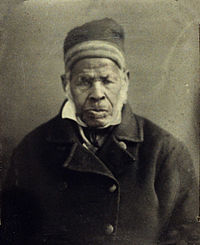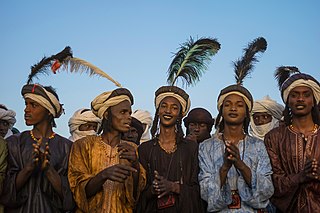
The Fula, Fulani, or Fulɓe people is an ethnic group in Sahara, Sahel and West Africa, widely dispersed across the region. Inhabiting many countries, they live mainly in West Africa and northern parts of Central Africa, South Sudan, Darfur, and regions near the Red Sea coast in Sudan. The approximate number of Fula people is unknown, due to clashing definitions regarding Fula ethnicity. Various estimates put the figure between 25 and 40 million people worldwide.

John Owen was the 24th Governor of the U.S. state of North Carolina and the state's first Democratic governor from 1828 to 1830.
Muhammadu Bello was the second Sultan of Sokoto and reigned from 1817 until 1837. He was also an active writer of history, poetry, and Islamic studies. He was the son and primary aide to Usman dan Fodio, the founder of the Sokoto Caliphate and the first Sultan. During his reign, he encouraged the spread of Islam throughout the region, increasing education for both men and women, and the establishment of Islamic courts. He died on October 25, 1837, and was succeeded by his brother Abu Bakr Atiku and then his son, Aliyu Babba.

Fouta Djallon is a highland region in the center of Guinea, roughly corresponding with Middle Guinea, in West Africa.

Omar ibn Said was a Fula Muslim scholar from Futa Toro in West Africa, who was enslaved and transported to the United States in 1807. Remaining enslaved for the remainder of his life, he wrote a series of Arabic-language works on history and theology, including a short autobiography.

The Adamawa Emirate is a traditional state located in Fombina, an area which now roughly corresponds to areas of Adamawa State and Taraba state in Nigeria, and previously also in the three northern regions of Cameroon, including minor Parts of Chad and the Central African Republic.
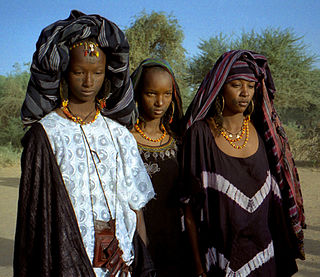
The Wodaabe is a name that is used to designate a subgroup of the Fula ethnic group who are traditionally nomadic found primarily in Niger and Chad. All Woodabe people should not be mistaken as Mbororo as these are two separate subgroups of the Fulani people. It is translated into English as "Cattle Fulani", and meaning "those who dwell in cattle camps". The Wodaabe culture is one of the 186 cultures of the standard cross-cultural sample used by anthropologists to compare cultural traits. A Wodaabe woman, Hindou Oumarou Ibrahim, was also chosen to represent civil society of the world on the signing of Paris Protocol on 22 April 2016.

The Imamate of Futa Jallon or Jalon, sometimes referred to as the Emirate of Timbo, was a West African Islamic State based in the Fouta Djallon highlands of modern Guinea. The state was founded in 1725 by a Fulani jihad and became part of French West Africa in 1896.
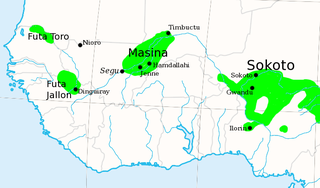
The Fulajihads sometimes called the Fulani revolution were a series of jihads that occurred across West Africa during the 18th and 19th centuries, led largely by the Muslim Fula people. The jihads and the jihad states came to an end with European colonization.

Presidential elections were held in Guinea in 2010. They were held under the two-round system, with the first round taking place on 27 June 2010 and the second round on 7 November, after an initial date of 18 July and several other postponements. Alpha Condé was declared the winner, with 52.52% of the votes in the second round. He assumed office on 21 December 2010.
Diallo is a transcription of an African surname of Fula origin. It is one of several common surnames used among the Fula.
Senegalese Americans are an ethnic group of Americans of Senegalese descent. In the surveys of 2019, 18,091 people claimed to be of Senegalese origin or descent in the United States. However, many West Africans trafficked by enslavers to the United States were also of Senegalese origin. Thus many African Americans may also have some ancestors of this country.
Malian Americans are an ethnic group of Americans with ancestry originating in Mali. According to the US Census Bureau ancestry survey, approximately 1,800 Americans stated they had Malian ancestry, making them Malian Americans. The survey did not take into account undocumented immigrants or people who did not participate in the survey, which could mean that many more uncounted Malians live throughout the United States.
Guinean Americans are an ethnic group of Americans of Guinean descent. According to estimates by 2000 US Census, there were 3,016 people who identified Guinean as one of their two top ancestry identities. However, in November 2010 the New York Times estimated that as many 10,000 Guineans and Guinean Americans reside in New York City alone.

Siradiou Diallo, a Fulani, was a Guinean journalist and politician of the opposition party Union for Progress and Renewal. He was a candidate during the 1993 Guinean presidential election where he received 11.86% of the vote. He also stood for presidency in the 1998 Guinean presidential election and the 2003 Guinean presidential election.

Karamokho Alfa was a Fula religious leader who led a jihad that created the Imamate of Futa Jallon in what is now Guinea. This was one of the first of the Fulbe jihads that established Muslim states in West Africa.
The Torodbe; singular Torodo were Muslim clerics and theocratic monarchs who preached and reigned in Futa Toro, a region located in the north of present-day Senegal, and other Fula communities in West Africa from at least the seventeenth to the early twentieth century. Drawn from all ethnicites and levels of society, the Torodbe aimed to 'purify' the Islam practiced in West Africa and establish Islamic states run with Islamic law.
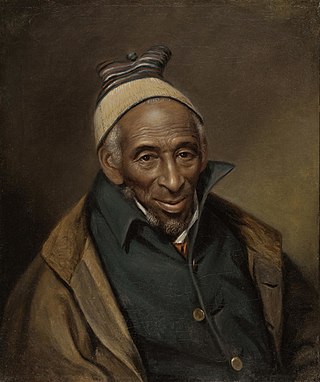
Yarrow Mamout was a formerly enslaved African entrepreneur and property owner in Georgetown, Washington, D.C. An educated Fulani Muslim, he gained his freedom in 1796 after 44 years as an enslaved person. James Alexander Simpson and Charles Willson Peale painted his portrait, Peale's being held in the Philadelphia Museum of Art.
